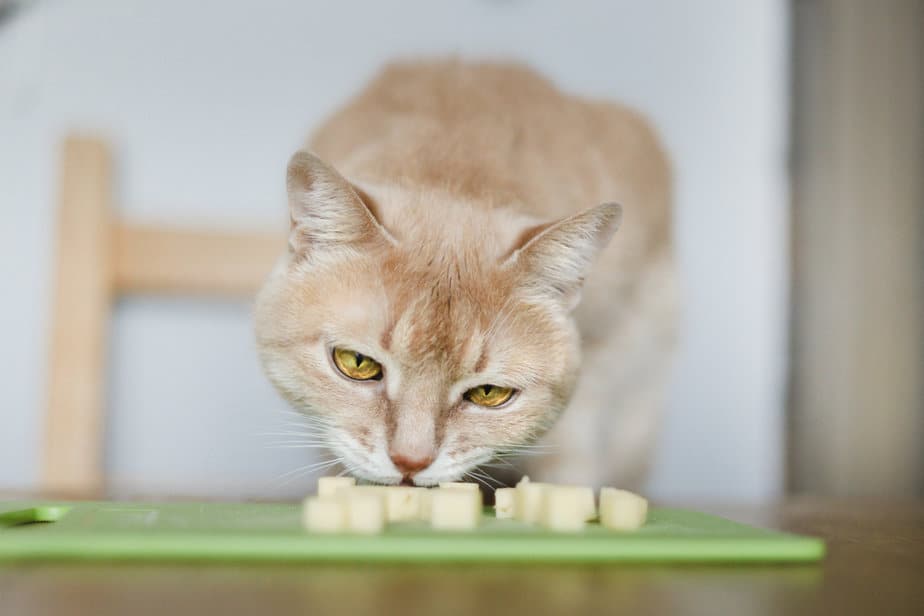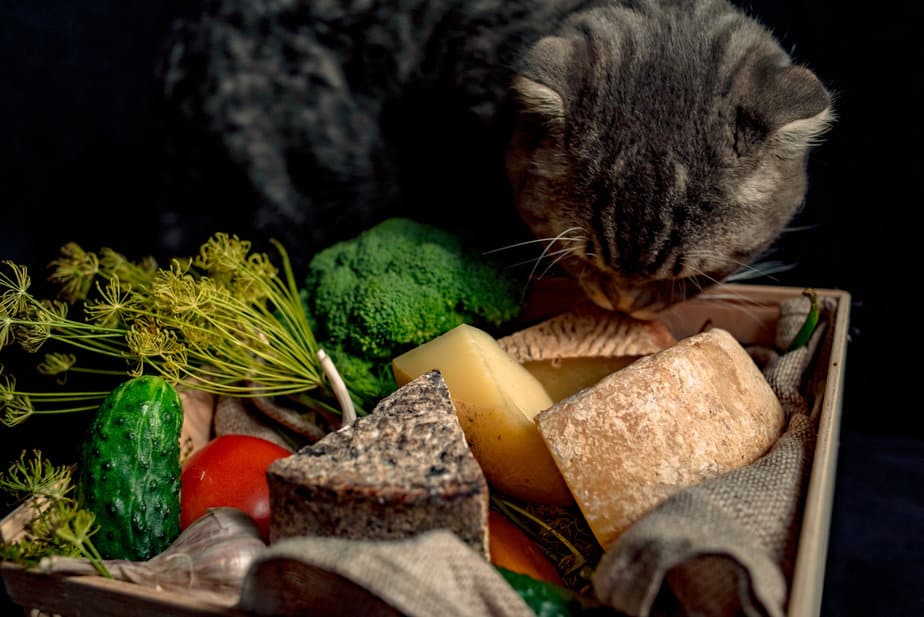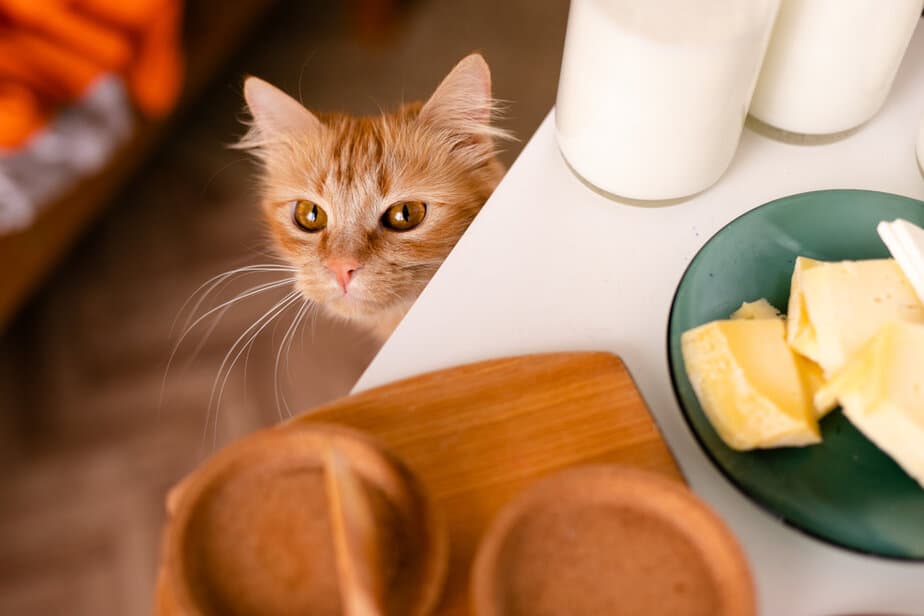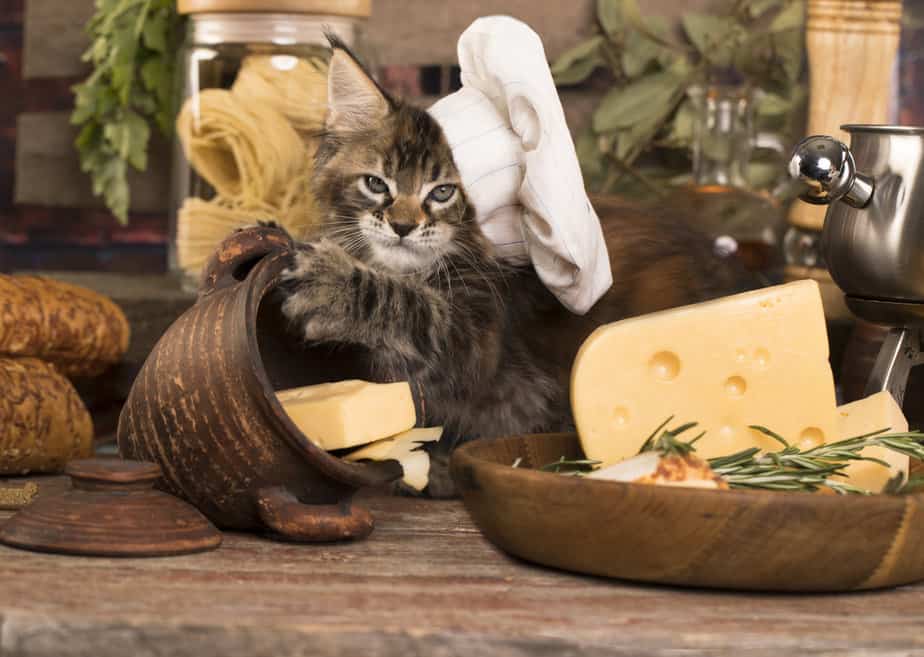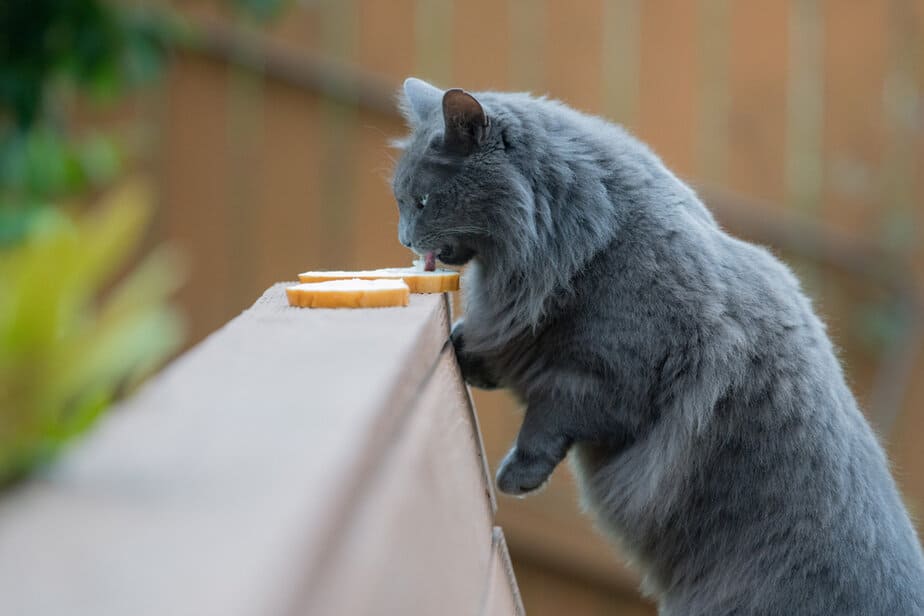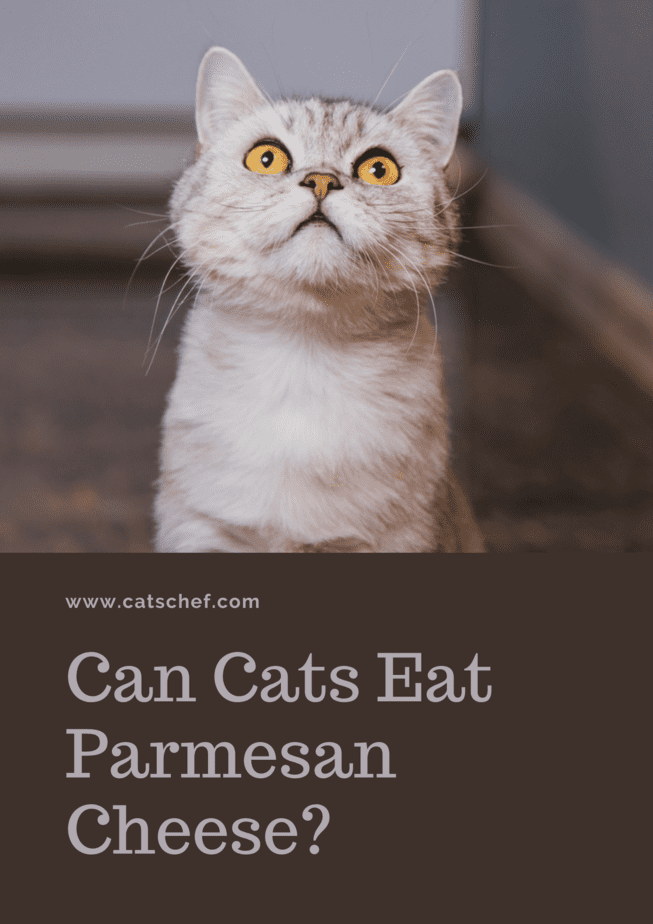📖 Table of Content:
Whether you’re seeing Tom and Jerry sharing a bowl of milk or Garfield doing all sorts of shenanigans for a slice of cheesy lasagna, you never question the love most cats show for dairy products. Well, this might be the right time to start questioning: can cats eat parmesan cheese?!
The more you learn about your four-legged friend, the more you realize there are certain foods she isn’t supposed to consume. One too many bites of cooked liver make her stomach cramp. Salty treats make her excessively thirsty. And, milky morsels make her gassy.
It’s your responsibility to do what’s best for your furry friend. But how can you ensure she doesn’t eat something that might cause her harm when that’s all she wants to do? You tell her “no” when she tries to bite into a rotten egg and she gives you that look.
You know exactly what look we’re talking about. The look that says “you don’t love me anymore.” The look that says “how can you live with yourself knowing you didn’t let me eat.” And of course, the look that says “I’m starving.”
And with that rant out of the way, we can go back to explaining the complicated relationship your feline friend has with parmesan cheese. According to our friends over at the ASPCA (American Society for the Prevention of Cruelty to Animals), parmesan cheese isn’t toxic to cats.
But… There’s always a but when it comes to feeding your furry friend anything that isn’t supposed to be a regular part of her diet. Parmesan cheese, along with most dairy products, might lead to an array of digestive issues. So, let’s start from the beginning.
So, can cats eat parmesan cheese?
First things first, can cats eat cheese in general?
Well, cats are obligate carnivores. This means that they require meat, animal protein, and animal-sourced nutrients to survive and thrive. While milk, cheese, and other dairy products do come from animals, they aren’t a natural part of your cat’s diet.
Believe it or not, most cats are lactose intolerant. When they’re still little, their digestive system produces lactase enzymes that are necessary to break down lactose. But, when they grow up and stop drinking their mother’s milk, they no longer need those enzymes.
So, what does that mean in terms of this particular type of cheese? Can cats eat parmesan cheese? Parmesan cheese falls under the category of hard cheeses. Unlike soft cheeses, hard cheeses contain less lactose. This makes them less likely to make your furry friend run to the litter box.
On the other hand, hard cheeses contain more salt in comparison to soft cheeses. While salt isn’t the worst thing your four-legged friend can put in her mouth, it’s certainly something you should avoid adding to her regular diet.
Either way, a small piece of cheese shouldn’t be the reason to raise panic and call every single vet in your area. Even as an occasional treat, parmesan cheese shouldn’t cause any harm to your cat because your cat’s digestive system should be able to digest such a small amount of cheese.
So technically speaking, cats can eat parmesan cheese. Next time your cat gives you that look, feel free to let her take a tiny bite but hide the rest someplace her pesky paws can’t reach. Don’t forget, your cat’s health is in your hands!
What makes parmesan cheese a bad choice for your cat?
You might have a hard time wrapping your head around the fact that cats can eat parmesan cheese but shouldn’t for multiple reasons. After all, parmesan cheese comes from animals, contains a bunch of animal-sourced protein, and tastes delicious. So, what seems to be the problem?
Human food and cat food differ for a reason. Your cat thrives on meat, animal protein, and animal-sourced nutrients. She doesn’t require pretty much any dairy, fruit, or veggies. Not only that, but these three things might even result in digestive problems in the long run. So, let’s dive in!
1. Dairy allergies
Parmesan cheese might have a high protein content, but… That’s not the type of protein your four-legged friend needs in her diet. Cover her tiny ears because she might be distressed after hearing that this tasty treat could cause her some serious health issues.
When you’re looking up “can cats eat parmesan cheese”, you might want to throw “can cats be allergic to parmesan cheese” into the mix, as well. Food allergies and intolerances are quite common among our four-legged friends and they’re often mistaken for something else.
When you’re planning on introducing new foods into your cat’s diet you might want to consult with your vet beforehand. There’s always a possibility your cat might be allergic to whatever you’re trying to introduce into her diet. How can you make sure you’re being careful enough?
Well, some of the most common symptoms to keep an eye on are bloating, weakness, loss of appetite, skin irritation and itchiness, vomiting, and diarrhea. While these symptoms might point to different conditions, they’re a clear sign that something isn’t digesting the way it should.
But, what about non-dairy cheese? Non-dairy cheese could be a great substitute for cats that have dairy allergies. But, there’s no reason why you should feed your cat something that isn’t going to provide her with any nutritional value (unless to draw a cute smile on her face).
2. Lactose intolerance
Let’s go back to the very important point we made at the beginning of the article. Most people have that image of a cat drinking milk engraved in their brains. But, most adult cats can’t do that without running to the litter box afterward.
While lactose intolerance doesn’t sound like that big of a deal to most humans, it could be incredibly dangerous for your cat to consume dairy products such as parmesan cheese over a longer period.
Too much lactose could lead to an array of digestive issues including stomach upset, diarrhea or constipation, and vomiting. Not all cats are lactose intolerant, but pretty much all cats will experience some level of discomfort after consuming too much lactose.
Their digestive systems aren’t designed with parmesan cheese in mind, to say the least. While an occasional bite of cheese shouldn’t cause serious harm to your four-legged friend, who’s to say what amount of cheese she would be comfortable with?
That being said, you can always consult with your vet before making any decisions regarding these types of treats. Trust me, it’s better to be safe than sorry when it comes to your cat’s health.
3. High salt content and high fat content
Feeding cheese to your furry friend has never seemed like such a huge hassle, but… The more you learn about the inner workings of her digestive system, the more you realize you need to put more thought into what foods get to touch her pouty snout.
Unfortunately for the “can cats eat parmesan cheese” question, this type of cheese contains way too much salt and fat to ever be considered a good addition to your cat’s diet. There’s no reason for you to stress about parmesan cheese when there are so many better cat treats out there.
While salt isn’t considered toxic to cats, it certainly isn’t something you want your cat to consume in excessive amounts. Too much salt might make your cat overly thirsty, uncomfortable, and irritable. Additionally, it might even lead to sodium poisoning.
On the other hand, too much fat might lead to weight gain, obesity, and diabetes. Don’t get me wrong, your four-legged friend would have to consume A LOT of parmesan cheese to experience any of these repercussions, but it’s better to stay on the safe side.
What about other types of cheese?
Believe it or not, not all cheeses of the world come from cow’s milk. Not all cheeses of the world contain the same amount of lactose. And, not all cheeses of the world wreak havoc in your cat’s digestive system.
In fact, parmesan cheese falls under the category of cheeses that aren’t so harmful to cats in the long run. It’s one of those cheeses you put on the charcuterie board when you’re petsitting your friend Howard’s ten-year-old British shorthair.
So, say “Cheese!” and take a look at some of the options you and your four-legged friend have. For instance, soft cheeses like cream cheese, cottage cheese, blue cheese, brie, feta, and mozzarella contain higher amounts of lactose.
Obviously, this means that they are even less suitable for your cat than parmesan cheese. Additionally, a lot of soft cheeses contain bacteria, mold, or other ingredients your cat’s digestive system isn’t equipped to digest.
Hard cheeses like swiss cheese, cheddar cheese, and parmesan cheese contain a smaller amount of lactose which makes them a better choice for your four-legged friend. That doesn’t mean you should throw a bunch of swiss cheese into your cat’s food bowl, but…
If your feline friend keeps showing interest in this tasty treat, you might want to give your vet a quick call and check which of these types of cheese you’re allowed to experiment with. Either way, an occasional bite of cheese shouldn’t cause any adverse reactions.
What to do if your cat accidentally eats parmesan cheese?
First things first, don’t panic! A small piece of parmesan cheese doesn’t contain enough lactose to send your furry friend running to the litter box or to cause any serious damage to her digestive system. Trust me, you have nothing to worry about!
You can give her some water to help break down and digest the cheese, and you can even give your vet a quick call to soothe your nerves. Your cat would have to consume A LOT of cheese to experience any of the reactions we talked about at the beginning of the article.
On the off chance that she did eat a bunch of parmesan cheese or she continued eating parmesan cheese over a longer period, you could keep an eye out for a couple of symptoms. Upset stomach, weakness and lethargy, vomiting, and diarrhea could point to a serious problem.
Either way, you should never make any significant changes to your cat’s diet without consulting your vet beforehand. Cats can eat parmesan cheese, but it’s better to be safe than sorry.
Your cat’s health should always be your number one priority and it’s your responsibility to make sure you’re taking proper care of her needs. And yes, even when she gives you that look.

